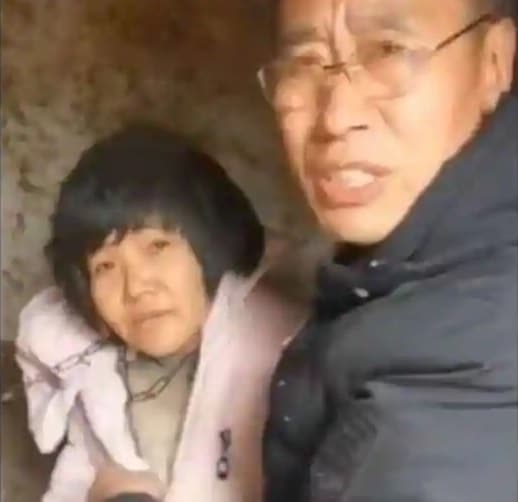A video of a chained-up mother of eight children was posted on Douyin (China’s TikTok) in late January – within days it was viewed over 3 billion times drawing ten times more online traffic than the Beijing Winter Olympics
Adam N Lee, chinaworker.info
The short video posted on 28 January, and soon deleted by censors, has rocked China. The case of the middle-aged woman, now known as “Xiaohuamei” in media reports, who was shown chained at the neck in a freezing shed in a village in Feng County, Jiangsu province, has undergone more twists than a Hong Kong crime movie. Despite repeated attempts by local government officials to lie themselves out of trouble, the shocking cruelty endured by “Xiaohuamei” has triggered a tsunami of outrage.
“If we fail to speak up today, anyone of us could be like that [Feng County] mother of eight” was a typical comment among many millions of online posts. The case brought home one of China’s open secrets: that trafficking of women and children is still rife in the rural hinterland, where a huge gender gap – too few women – has created a market for “wives”.
Sex-selective abortions
Since 1980, thirty more million men have been born than women as a result of the strict one-child policy. That policy was eventually abolished in 2016. Male children are traditionally favoured over females because they “continue the family line”. A 2019 study of global population data by the National University of Singapore concludes that sex-selective abortions led to at least 23 million fewer girls being born over the past fifty years, with China accounting for half (51 percent) of the total.
The plight of young women and girls (usually aged 14-30) from poor rural communities who are kidnapped, trafficked across the country, sold, raped, beaten, forced to have children and to “marry”, has also highlighted the disadvantaged position of Chinese women in general, as patriarchal and sexist structures and prejudices refuse to die out and are even reinforced by authoritarian rule and capitalist policies.
The video of “Xiaohuamei” was apparently never intended as an exposé. The film’s focus was the husband, raising eight children by himself in a poor community, in order to drum up charitable donations. The camera then stumbles across the chained-up woman, who suffers from a mental disorder and is prone to violence, the video said. Within hours in a collective “WTF” moment the video became by far the biggest talking point on China’s social media, pushing the Beijing Winter Olympics into the background. Netizens demanded to know what was happening and questioned how deeply the government, police and social services were implicated.
The local governments in Feng County and the upper-level city of Xuzhou issued four statements over the ensuing three weeks in an attempt to damp down the public outcry. Each of these releases contained deliberately misleading information. The first three statements ruled out human trafficking. They described the husband as a “model parent”. The fourth statement admitted what everybody already knew, that “Xiaohuamei” was a trafficking victim. The husband was arrested for “illegal detainment” along with several others.
Eight children
Netizens had questioned how it was possible for a woman to give birth to eight children, which is illegal even today under the less restrictive three-child policy. The facts which eventually emerged proved beyond doubt that the local authorities, police department, family planning agency, and the court that issued a marriage license although one party was classified as “mentally ill”, were all complicit.
As a trafficking victim, a new identity had been purchased for “Xiaohuamei” to make it difficult for relatives or anti-trafficking activists to trace her. This is normal in trafficking cases and is impossible without official collusion. The local government’s attempt at a cover up was demolished by wave after wave of online scrutiny – a mass ‘cross examination’ – that picked apart the lies one after another. Independent investigative journalists, risking severe sanction, dug deep to find documents such as the original marriage certificate, which disproved the government version. Feminist activists went from other regions of China to try to liberate “Xiaohuamei” who by this time had been transferred to a hospital and diagnosed with schizophrenia. “The world has not abandoned you. Your sisters are coming!” said two, who however were arrested and expelled from Feng County.
Media now reported that “Xiaohuamei” was born in the southwestern province of Yunnan. The timeline put forward in the official statements of how she came to be more than 2,000 km away in Feng County was also discredited under a bombardment of online criticism. Eventually, by late February, the provincial government in Jiangsu intervened in the case.
They issued a “final” statement saying that “Xiaohuamei” had been abducted from her hometown in 1998 and sold at least three times into forced marriages. Seventeen local officials in Feng County were punished for misconduct and dereliction of duty, they said. The County-level CCP (so-called Communist Party) chief Lou Hai was removed from office along with the head of the county government, Zheng Chunwei.
Priority is “stability”
DNA tests, however, do not confirm the official story, that the real identity of “Xiaohuamei” is a girl abducted from Yunnan. Other theories have surfaced on the internet and distrust towards official statements is sky high. As in other cases the default mode of the CCP regime is to close down all threats to its “stability” rather than to deal with root causes. With the ‘two sessions’ (Lianghui) of the National People’s Congress and Chinese People’s Political Consultative Conference starting their annual meeting on 4 March, the Jiangsu provincial leaders were ordered to put out the fire.
Selecting a few errant CCP officials and local departments for punishment is standard procedure to defuse mass anger. But the most serious punishments will be reserved for whistle-blowers and activist-journalists whose investigations helped to expose the scandal. On 21 February, the village in Feng County was sealed off with road blocks and the deployment of militia.
The Feng County scandal is “just the tip of the iceberg” as many netizens recognise. Rather than an isolated case, trafficking and selling women for “marriage” is a nationwide industry, technically illegal but operating with a significant degree of official tolerance. Xuzhou has traditionally been a major human trafficking hub. “Nearly 6,000 women were abducted and sold to the area of the city from 1985 to 1988,” Caixin reported. Nowadays, despite periodic police crackdowns, there are still 20,000 trafficking cases reported each year in China.
Victims, usually from poorer southwestern provinces, are sold in wealthier provinces with bigger gender imbalances, such as Jiangsu, Zhejiang, Fujian, Shandong and Anhui, according to a 2005 study by the Zhejiang Academy of Social Science.
Parents who buy a “wife” for their son as seems to have happened in the case of “Xiaohuamei” can count on protection and support from the local authorities as well as traditional clan structures that are still powerful in China’s countryside. “Even some relatives and friends of law enforcement officers have bought wives,” a Shanghai based lawyer told the South China Morning Post.
This newspaper also quoted a former prosecutor, “The villagers didn’t have the legal consciousness, they generally thought it was very normal to buy a wife.” Women who tried to escape would usually be beaten, he said.
It has been a criminal offence since 1997 to buy a wife, but there is widespread criticism that the laws are too lenient, with many local authorities clearly complicit in these criminal activities. This horrific trade in women cannot simply be blamed on rural “backwardness”. It is China’s rural population that has borne the brunt of capitalist restoration, suffering terribly through long-term family separation, an exodus of young people to find work in the cities, including most young women, plus the tragedy of “left behind” children who hardly ever meet their parents – an estimated 60 million of them today.
Hukou system
The rigid hukou system, a form of apartheid that legally segregates the “two Chinas” – wealthy city people from poor villagers – is another root of this problem. In general, young rural women will look for a husband possessing a city hukou as a way to escape. In some villages the gender ratio of young men to women is ten-to-one.
By persecuting feminism and all attempts of women to organise to fight for their rights, and pursuing vicious capitalist policies that aggravate the demographic crisis and reinforce sexist attitudes, the CCP has no answers. The trafficking business in China is de-facto legalised not only because of the huge profits generated, but because it is also seen by the government as a way to relieve the acute gender imbalance and low birth rate. Indeed, without fundamental system change, to abolish class and gender oppression and overcome the big urban-rural wealth gap, a crackdown on trafficking, which Xi Jinping may launch as a temporary populist measure, will not solve the problem.
“Ten years in prison for trafficking a panda, three years for a woman…”
Andrea from ISA in Taiwan addressed an international rally on socialist feminism organised by ISA on 6 March – this is what she said:
The Chinese dictatorship is trying to eradicate feminism. There is a severe crackdown against feminist ideas and web pages. The so-called Communist Party government uses extreme nationalism and repression. It says feminism is “anti-China” and part of a US plan to create problems in China.
LGBTQ people are also under attack. Chinese officials say homosexuality is a Western creation. The American TV sitcom ‘Friends’, which is very big in China, has been censored. For example, one of the main characters has a child whose mother is a lesbian. But not in the Chinese version. LGBTQ people cannot be shown on TV.
In February, China was hit by the biggest political scandal since the start of the pandemic in 2020. This is the shocking case of a woman who was chained by the neck and kept in a freezing, dirty shack in Feng County, eastern China. She gave birth to eight children and was put in chains because she was “mentally ill”.
On 1 February a TikTok video of the chained-up woman was viewed over 3 billion times before being blocked by censors. For weeks this case completely overshadowed the Beijing Olympics with ten times more online posts about the chained-up woman than the Olympics. Groups of women tried to go to rescue the victim. They were stopped by police and some were arrested. This case provoked mass anger against the government’s attempts to cover up the truth.
Trafficking of “wives”
The terrifying truth is trafficking of women and girls in China. They are kidnapped and sold to men to be their “wives”, to be raped and made to have babies. The chained-up woman had eight children, which is illegal in China. This proves the collusion of the police and local government. In many local areas the Communist Party, the police, the courts, are complicit in this illegal trade in women. Under Chinese law, you get ten years in prison for trafficking a panda, but only three years for trafficking a woman.
Trafficking has grown because of the women deficit in China. There are 30 million more men than women. For 36 years the Communist Party imposed very hard control over women’s reproductive rights: the one-child policy. During this time, boys were preferred over girls due to the pressure of sexist patriarchal structures and attitudes.
It is linked to the brutal restoration of capitalism in China. Welfare was destroyed by privatizations and lack of funding. The capitalist economy gave baby boys a higher status: Men get better jobs and property entitlements. Seven million sex-selective abortions were carried out. Female fetuses were aborted. This economic and sexist pressure to have male babies led to the population crisis.
The Communist Party today is a right-wing capitalist dictatorship, which wants to control women’s bodies, but now to pressure them to have more babies. It is attacking abortion rights by creating more red tape to limit abortions on “non-medical” grounds. It wants to reinforce the “traditional family” led by “masculine” men. This is a tool of social and political control.
Harder to divorce
The new three-child policy was launched by Xi Jinping in 2021 to promote more babies. But the three-child policy weakens the status of women in the labour market. Bosses are even more unwilling to employ women because they don’t want to pay for maternity leave and childcare.
The divorce law of 2020 has led to more court rulings refusing divorce. Divorce cases fell by more than half last year. China in the 1950s was much poorer than today. But it introduced a revolutionary divorce law that increased equality between men and women.
Today’s dictatorship serves capitalism. It reinforces many of the worst forms of women’s oppression. The mass anger over trafficking in Feng County shows the real mood in Chinese society against enslavement and oppression of women. Xi Jinping wants to destroy feminism, but that is like turning back the ocean. It will fail. I am Taiwanese. ISA in Taiwan express our full solidarity with feminists in China against repression. We fight for socialist feminism to link with workers’ struggles and terminate the evil, sexist, capitalist system.




